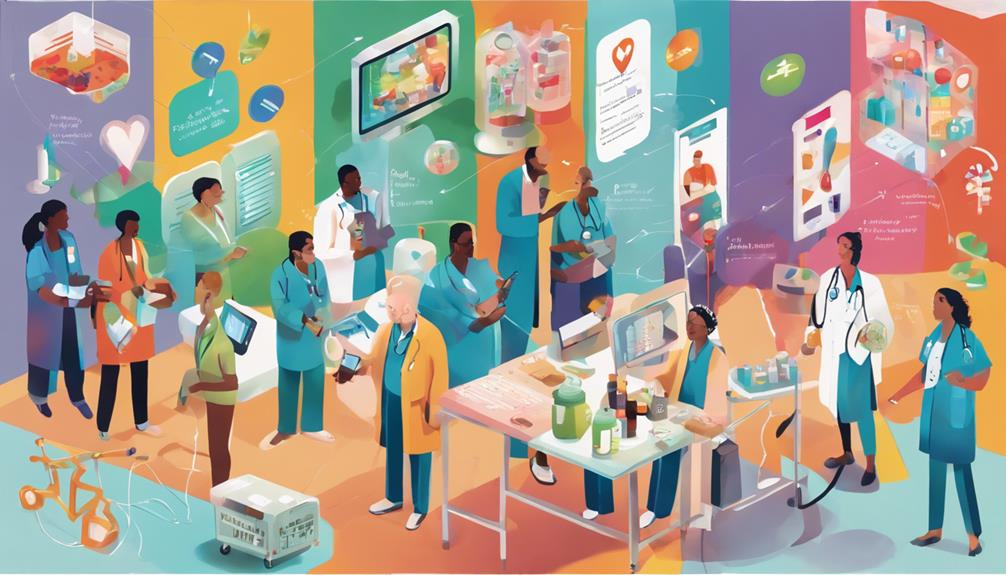To find health services that suit your needs, start by identifying the types available in your area. Local clinics and urgent care facilities handle non-emergency situations efficiently, often with shorter wait times. Hospitals offer extensive emergency services for life-threatening conditions. Consider telehealth options for convenient access to care from home, especially for routine consultations. Specialized providers enhance treatment tailored to specific health concerns, while community health resources offer preventive services and education. Understanding these options is vital for effective healthcare management. Exploring further will provide you with more insights into how to navigate these choices effectively.
Understanding Health Service Types

When exploring the landscape of health services, it's crucial to recognize the various types that cater to different needs and populations.What Are The Yoga SutrasWhen Was Yoga DiscoveredIs Hot Yoga Healthy
One key category is primary care, which serves as the first point of contact for individuals seeking health services. Primary care providers, such as family physicians and internists, focus on thorough, continuous care. They manage a wide range of health concerns, facilitating access to preventive services that can reduce the risk of chronic diseases.
Preventive services are integral to primary care, emphasizing the importance of early detection and intervention. These services include vaccinations, screenings, and routine check-ups designed to identify health issues before they become serious.
Research shows that individuals who engage with preventive services tend to experience better health outcomes and reduced healthcare costs over time.
Local Clinics and Urgent Care
Local clinics and urgent care centers play an essential role in providing accessible healthcare services for non-emergency situations and immediate health concerns.
These facilities are designed to handle a variety of issues, such as minor injuries, illnesses, and routine vaccinations, often with shorter wait times than traditional hospitals. Research indicates that local health services can greatly reduce the burden on emergency departments, allowing them to focus on more severe cases.
Community clinics, often staffed by qualified healthcare professionals, offer a range of services tailored to the needs of the population. They prioritize patient-centered care and often provide extended hours, making it easier for you to seek treatment outside typical office hours.
Additionally, many community clinics operate on a sliding scale, ensuring that cost isn't a barrier to receiving care.
Hospitals and Medical Centers

When considering hospitals and medical centers, it's crucial to understand the various types of facilities available and the services they provide.
You'll find that these institutions not only offer emergency care but also specialize in numerous treatment options tailored to specific health needs.
Analyzing the capabilities and resources of these medical facilities can greatly influence your healthcare decisions.
Types of Medical Facilities
What distinguishes hospitals from medical centers is their varying scope of services, with hospitals typically offering a broader range of emergency and specialized care while medical centers often focus on outpatient services and primary care.
Hospitals are equipped with advanced technology and staffed by specialists, providing critical interventions that can save lives. They usually have intensive care units, surgical facilities, and a variety of diagnostic services.
On the other hand, medical centers prioritize preventive care and wellness programs, emphasizing the importance of maintaining health before issues arise. They often offer routine check-ups, vaccinations, and screenings, which are essential for early detection of health conditions. By focusing on outpatient services, medical centers can foster an ongoing relationship with patients, guiding them through various wellness initiatives.
In essence, while hospitals serve as critical care providers during emergencies and complex health situations, medical centers aim to support your overall health through preventive measures and regular health maintenance. Understanding these distinctions can help you choose the right facility based on your immediate health needs and long-term wellness goals.
Emergency Care Services
Emergency care services provided by hospitals and medical centers differ considerably in their approach, with hospitals typically equipped to handle life-threatening situations while medical centers focus on urgent but less vital health issues.
Hospitals often have extensive emergency preparedness protocols in place, including specialized trauma response teams that can quickly assess and treat severe injuries or illnesses.
In contrast, medical centers generally cater to individuals with non-life-threatening conditions, such as minor injuries, infections, or illnesses that require prompt attention but aren't emergencies. This distinction is essential for you to understand when deciding where to seek care.
When confronted with a medical crisis, knowing whether to go to a hospital or medical center can greatly impact outcomes. Hospitals are more likely to have the advanced technology and specialists necessary for complex cases, while medical centers can provide efficient care for less vital situations.
Ultimately, both facilities play important roles in the healthcare system, but their differing capabilities highlight the importance of understanding emergency preparedness. Being informed can help you navigate these options effectively, ensuring timely and appropriate care during critical moments.
Specialized Treatment Options
Hospitals and medical centers offer a range of specialized treatment options tailored to address specific health needs, ensuring patients receive appropriate care based on their conditions.
These facilities often feature specialized departments or units, such as oncology, cardiology, and orthopedics, where healthcare professionals employ targeted strategies to manage complex health issues.
In addition to traditional medical treatments, many hospitals now integrate alternative therapies into their care plans. This approach aligns with the principles of integrative medicine, which emphasizes treating the whole person rather than just the symptoms.
For example, some hospitals may offer acupuncture, massage therapy, or nutritional counseling alongside conventional treatments, allowing you to explore various avenues for healing.
Research supports the efficacy of integrative medicine, indicating that combining traditional and alternative therapies can enhance recovery and improve overall well-being.
As you navigate specialized treatment options, consider discussing these integrative approaches with your healthcare provider. They can help you identify which therapies might complement your existing treatment plan and best suit your individual health needs.
Telehealth Services
Telehealth services offer significant benefits, such as increased convenience and improved access to care, particularly for those in remote areas.
You can access these services through various platforms, making healthcare more flexible and manageable.
Understanding how to effectively leverage telehealth can enhance your overall health experience.
Benefits of Telehealth
Accessing healthcare through telehealth services offers numerous advantages, including increased convenience, improved access to specialists, and enhanced patient engagement.
One of the key telehealth advantages is the ability to conduct virtual consultations, allowing you to connect with healthcare providers from the comfort of your home. This not only saves time but also reduces travel costs and minimizes the disruption to your daily routine.
Moreover, telehealth eliminates geographical barriers, enabling you to consult with specialists who may not be available in your local area. This access to diverse expertise can lead to better health outcomes, particularly for chronic conditions requiring ongoing management. Studies have shown that telehealth can improve adherence to treatment plans, as the ease of scheduling virtual visits encourages regular check-ins with healthcare providers.
Additionally, telehealth fosters enhanced patient engagement by providing tools for better communication and education. You can easily access your medical records, receive reminders for appointments, and engage with health management apps.
Accessing Telehealth Services
Finding the right telehealth service involves evaluating various platforms that offer virtual consultations, ensuring they meet your specific healthcare needs and preferences.
Start by researching providers that specialize in your health concerns. Look for platforms that provide not just video consultations but also extensive services like remote monitoring. This feature allows healthcare professionals to track your health metrics in real-time, enhancing the quality of care you receive.
Next, consider the technology used for these consultations. User-friendly interfaces and reliable connectivity are vital for a seamless experience. Check reviews and testimonials to gauge patient satisfaction and service effectiveness. Additionally, verify that the telehealth service is compliant with healthcare regulations, ensuring your privacy and data security.
Lastly, assess your insurance coverage. Many providers accept various insurance plans, but it's important to confirm this beforehand to avoid unexpected costs.
Specialized Health Providers

How do specialized health providers enhance the quality of care through their targeted expertise and tailored treatment plans? Their deep knowledge in specific areas allows them to deliver interventions that address the unique needs of patients.
For instance, in integrative medicine, specialized providers combine conventional treatments with holistic therapies, creating a thorough approach to health. This method not only focuses on the disease but also considers emotional and physical well-being.
Research indicates that patients under the care of specialized providers often experience better outcomes. These experts utilize evidence-based practices, ensuring that treatments are both effective and relevant. By closely monitoring patient progress and adapting treatment plans as necessary, they can achieve ideal results.
Moreover, specialized health providers often collaborate with other professionals to offer a multidisciplinary approach. This teamwork can lead to more cohesive and thorough care, further enhancing the patient's experience.
When you're seeking care, understanding the role of these providers is essential. They not only offer targeted treatment but also empower you with knowledge and strategies that support long-term health.
Ultimately, their expertise is significant in maneuvering complex health issues successfully.
Community Health Resources
Community health resources play an essential role in promoting wellness and preventing disease through accessible services and education tailored to the needs of local populations. These resources often include community clinics, wellness programs, and educational workshops designed to enhance community wellness. By addressing specific health challenges faced by individuals, they provide preventive care that can considerably reduce the incidence of chronic diseases.
For instance, many community health organizations offer screenings, immunizations, and health education aimed at preventing conditions such as diabetes or hypertension. Research indicates that when communities engage with these resources, they experience improved health outcomes and increased health literacy.
Additionally, these resources foster collaboration among local health providers, schools, and non-profit organizations, creating a supportive network that promotes overall well-being. Your participation in community health initiatives can empower you to take charge of your health and encourage others to do the same.
Navigating Insurance Options

Understanding your insurance options is essential for accessing necessary health services and can greatly impact your overall healthcare experience.
To make informed decisions, you need to develop insurance literacy, which involves understanding the different types of plans, benefits, and costs associated with each option. Familiarizing yourself with terminology like deductibles, copayments, and out-of-pocket maximums is critical.
When evaluating your insurance options, a coverage comparison is important. This entails examining what services are covered under each plan, such as preventive care, specialist visits, and medications. Some plans may offer broader networks of providers, while others might have lower premiums but higher out-of-pocket costs.
Moreover, consider your healthcare needs. If you have chronic conditions or anticipate needing frequent medical care, a plan with a higher premium but extensive coverage might be more beneficial than a low-cost option with limited services.
Conclusion
In summary, steering through health services requires understanding the various options available to you.
From local clinics and hospitals to telehealth and specialized providers, each plays a vital role in your care.
Community resources further enhance accessibility, ensuring you can find support when needed.
Additionally, being informed about insurance options can greatly impact your ability to utilize these services effectively.
By taking a proactive approach, you can optimize your health and well-being in today's complex healthcare landscape.
